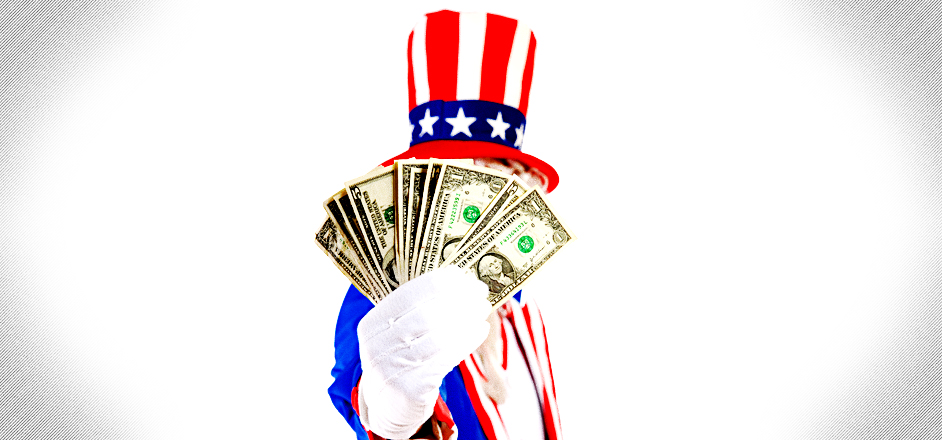In today's hyper-tense relationship between civilians and police, one occasionally has to ask themselves the question: who's the real bad guy here?
Is it the criminal?
Or, is it the cop?
A little thing called "civil forfeiture" definitely makes the case for the latter. This controversial and little-known legal process allows cops to confiscate unlimited property from civilians, with little oversight, and for hardly any reason at all. In the name of stopping crime, cops can legally fleece unsuspecting mooks out of drugs, cash, cars and jewelry. They can set up traffic stops on drug-running corridors not to nab the drugs — which are worthless to them — but to grab the money — which they can keep and use for whatever they want. It's such an obvious abuse of power that Bloomberg News compared police who abuse civil forfeiture to "self-funding armed gangs."
They're not wrong. In 2014, law enforcement officers took more property from Americans than burglars did. Since 2007, the DEA has seized $4 billion from people; mostly innocent ones who were never charged with a crime.
"People are amazed that this happens in the U.S. It sounds like North Korea," said Darpana Sheth, a lawyer for the Institute for Justice and director of their nationwide initiative to end civil forfeiture abuse, by phone.
This happens all across the country, but let's take a look at just one department, to see how it works. A spreadsheet provided to us by the Denver Police Department shows that Denver cops took from suspected criminals all kinds of things: Jeep Wranglers and Honda Pilots and Porsche Panameras, 14K gold chains, diamond-encrusted Johnny Dang gold watches.
And what did the Denver Police Department do with all this cash and stuff? It balled out of control.
In 2015, it used the money to buy WiFi equipment, printers, Blu-Ray duplicators, CrossFit classes, digital cameras and OtterBoxes for their cell phones. They spent more than $1 million of mostly innocent people's dollars on this stuff. And that's just in the city of Denver.
Laws like this started reasonably enough. They were useful in shipyards going back hundreds of years. When contraband was dropped off at the port, the police could seize it and hold it and maybe eventually keep it, even if the owner was already back out to sea. Makes sense. But over the decades the laws oozed inland, and the scope spread. During prohibition, cops started to seize not just the contraband rum, but the cars used to run it. During the dark Drug War days of the '70s, '80s and '90s, the laws metastasized, and cops started grabbing stuff like looters in the L.A. riots.
But change is coming, and swiftly. Eighty percent of people support reform, Sheth said. "Either you're a person who doesn't know what civil forfeiture is, or you know about it and you're against it."
A guy we'll call Nat told us how this goes down. On his way from Colorado to a music festival in Michigan, Nat was stopped driving through Kansas with a scale, a little less than an ounce of weed and a tin of salvia divinorum. The cops jailed him for a few days and impounded his 2001 Nissan Xterra, which they said, falsely, Nat was using to traffic "extremely high grade" weed for big Colorado growers. In fact, his weed was mid at best, Nat says. Cops built a case for a felony, but told him that if he forfeited his Xterra, they'd drop the charges to a misdemeanor. Nat said ok.
More than 20 states have already passed reform bills. In Colorado, Representative Leslie Herod is introducing a bill that would change the laws. "If you are not convicted of a crime, you should not have to forfeit your property," Herod told us. It won't be an easy bill to pass, because cops like that easy stream of revenue. They're also well-represented in the statehouse. "It's a pretty tough lobby to crack," she said.
All of this matters not only because it seems pretty fucked up that cops can get away with this, but because it might shape the future. Right now, there's a raging debate about whether Trump and his weed-hating top cops are going to crack down on legal weed. Many people ask: Why would they do that? Where's the incentive? Think about it — there's so much money, property, cars and buildings paid for by weed sales.
"That's a huge cache of funds," John Krieger, a lawyer and spokesman for the ACLU of Colorado, told us. "If the government starts to do overnight raids of every marijuana dispensary in the state, you're talking about a large amount of money and property that could be quite profitable for the federal government."
Until the laws change, the drug game is going to stay profitable for a lot of people, and civil forfeiture is another reminder that, when it comes to drugs, the government is stacking paper as much as — if not more than — anyone else, and that taking shit that isn't theirs isn't limited to street hustlers and gangsters — it's your boys in blue.



Leave a Reply
You must be logged in to post a comment.